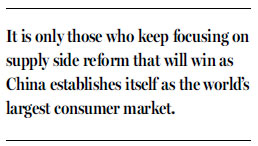Supply side reform a positive endeavor for businesses to embrace
By Zhu Qiwen (China Daily) Updated: 2016-01-14 07:48
This means better meeting the growing appetite of Chinese consumers for high-quality goods and services. An avalanche of complaints about poor tourist services or fake goods bought online are clear evidence that businesses in China's domestic tourism market and online retail market still have a lot to do to serve consumers in the fast-growing domestic market.
The sharp contrast between the growth stories of KFC and Starbucks in China may attest to the fact that success is not guaranteed even for foreign champions if they cannot follow the changing tastes of Chinese consumers.
On the one hand, the great enthusiasm with which Chinese consumers have embraced Starbucks prompted the Seattle company to say recently that it expects China to eventually overtake the United States as the coffee chain's largest market. It said that it is on track to open 500 stores in China this year and expects to have a total of 3,400 stores in China by 2019.
On the other hand, KFC, a long-term top player in China's fast food market, has been hit by food safety scandals and its clumsy attempts to adapt to Chinese consumers' inclination to use smartphone apps to order food, forcing its parent company to cut its global forecasts due to the weakness in China.
A glance at KFC's changing fortunes in China will probably add credit to the narrative that slowing growth in the world's second-biggest economy is hitting consumers' willingness to fork out on discretionary spending. But a close look at Starbucks' contrasting fortunes warrants a second thought about gloomy predictions for the Chinese economy.
There may be reasons in terms of their business models or management to explain the different growth stories of the two US brands in China.
But the simple fact to remember is not everyone will benefit from China's economic transition. It is only those who keep focusing on supply side reform that will win as China establishes itself as the world's largest consumer market.
The author is a senior writer with China Daily.
zhuqiwen@chinadaily.com.cn

I’ve lived in China for quite a considerable time including my graduate school years, travelled and worked in a few cities and still choose my destination taking into consideration the density of smog or PM2.5 particulate matter in the region.











